Between the new foods, the new culture, the sights, and the smells, it can be easy to get overwhelmed in a foreign country. Especially in a country where you’re unfamiliar with the language. It can leave you feeling like you don’t know what’s up and what’s down! But don’t let this stop you from visiting beautiful Spanish-speaking countries like Peru, Mexico, Guatemala, and Spain! Many people do speak English, but knowing a few essential Spanish travel phrases will go miles in making you feel more comfortable in your surroundings.
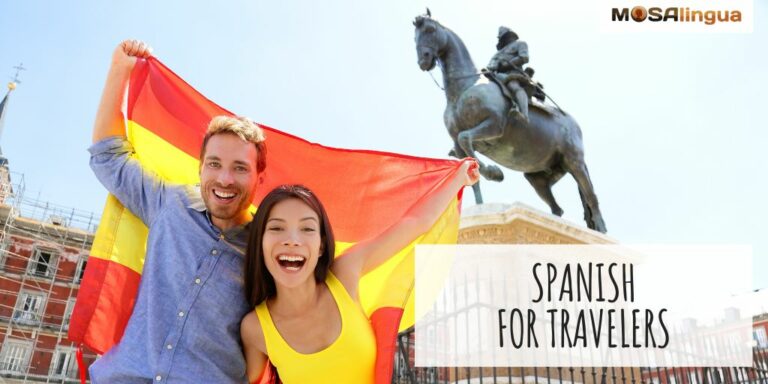
10 Common Spanish Travel Phrases to Know Before Visiting a Spanish-Speaking Country
Here are 10 common Spanish travel phrases to learn before you take off:
La Cuenta, por favor — Check, please.
La cuenta can mean a few different things, including account and calculation, but it’s very useful in travel contexts because it also means: the bill/check.
When traveling to a Spanish-speaking country, knowing how to ask for the bill will come in handy when eating out. Adding por favor will ensure that you are polite by saying please!
¿Puede hablar más despacio, por favor? — Can you speak more slowly, please?
There is a range of different dialects and Spanish accents, so even if you have some Spanish under your belt, there’s a good chance that you may not understand what a Spanish speaker is saying.
Unfortunately, the chances of not understanding increase exponentially when a native speaker is talking quickly.
Don’t be afraid to ask your speaking partner to slow down a bit by saying ¿Puede hablar más despacio, por favor?
¿Dónde está el baño? — Where is the bathroom?
When you gotta go, you gotta go and if you don’t know where the bathroom is that can pose a problem, especially if you don’t know how to ask.
Dónde is Spanish for where, which is a very useful word when you’re traveling in a Spanish-speaking country. Add to it está el baño? and you’ll be good to go—to the bathroom, that is.
¿Qué significa su nombre? — What does your name mean?
One of the best parts of traveling to a foreign country is that you get to meet new people from all walks of life. Most of them will be happy to speak with you, but having a couple of conversation starters under your belt is a good way to open a dialogue with someone in a foreign language.
You’ve probably already got down ¿Como se llama?, which is one of the more simple Spanish travel phrases meaning, what is your name?, but ¿Qué significa su nombre? (what does your name mean?), is a great one to know as well. It’s an excellent way to follow up when someone tells you their name, especially if it’s a unique one you’ve never heard before.
You can learn all sorts of things from the meaning of someone’s name, such as its cultural origin or the famous Spanish movie star that they were named after!
¿Cuánto cuesta? — How much does it cost
Cuánto is Spanish for how much and cuesta is it costs. This is a must-know phrase to have in your arsenal, especially if you plan on doing some shopping.
If you want to know how much something specific is, add a definite article and noun.
For example, ¿Cuánto cuesta el bolso? meaning How much is the purse? If you’re holding something up to the shopkeeper, then you can also ask, ¿Cuánto cuesta esto?, which means How much is this?
Lo siento, no entiendo. — I’m sorry, I don’t understand.
When communicating with someone who speaks a different language, it’s perfectly normal to not understand certain things.
Don’t be afraid to say that you’re not comprehending so they can phrase things differently or even switch to English. This is extremely useful as far as Spanish phrases for travel go, especially when talking to a police officer, waiter, or taxi driver.
Me gusta lo que lleva puesto. ¿Dónde lo compró? — I like what you’re wearing. Where did you buy it?
Spain has some of the best shopping in the world, especially in one of the fashion capitals of the world: Madrid. However, no matter where you go, from Colombia to Spain, Spanish-speaking countries are known for their colorful, vibrant wear.
Chances are you’ll see someone donning a dress or tie that you MUST have. If you know how to ask them where they got it, then you might just get to bring one home!
Besides, telling someone you like what he or she is wearing will brighten their day and is a great conversation starter. You’ll come off as outgoing and may even get a recommendation for a boutique that only locals know about.
¿Dónde está el/la…? — Where is the…?
You already learned how to ask where the restroom is, but you can use this phrase to locate lots of different places!
Make sure that you also know a few words to along with it such as hotel (hotel), restaurante (restaurant), and baños (bathrooms).
¿Hablas inglés? — Do you speak English?
If your Spanish isn’t good enough to converse fluently (or if you’re just feeling really jetlagged) then you can always ask someone if they speak English to give your brain a break.
However, it’s best to use this phrase sparingly, especially if you’re committed to learning a new language. Don’t be afraid to mess up; whomever you’re speaking to will understand that Spanish isn’t your native tongue.
¿A qué hora abre? — When do you open?
If you’re in a Spanish-speaking country that traditionally observes siestas (afternoon naps), you’re going to need to plan your day around it. Life is literally put on hold for a few hours during this time. That means you’re out of luck if you want to get food or go shopping.
For instance, in Spain, it’s typical for businesses to close their doors for siesta between 2 pm and 5 pm. Restaurants typically go on break from 4 pm to 8 pm.
There you have it: some common Spanish travel phrases that you should know when visiting a foreign country! Knowing these will help you navigate your way through all your Spanish adventures.
Before taking off, download the Mosalingua Spanish app to learn even more Spanish phrases and words using our memorization system.
WATCH: Spanish for Travelers: Useful Phrases and Cultural Etiquette
Our instructor Lisa recorded a video that introduces some of these phrases (and many more). She also covers important tips about cultural expectations that travelers should be aware of. The video is in Spanish, but subtitles are available in English and a few other languages. Just click the settings gear at the bottom right corner to turn them on. Watch it right here or on our YouTube channel.
Subscribe to our channel for more fun language-learning videos!
Next Steps
If you enjoyed this article, you might also like:
- 10 Popular Spanish Slang Words to Sound More Like a Local
- 13 Spanish Slang Words to Speak Like a Latin American [VIDEO]
- Ten Must-Know Spanish Sentence Starters and Filler Words
- Essential Spanish Phrases for Beginners and How to Use Them
Related posts:
Improve your spoken Spanish
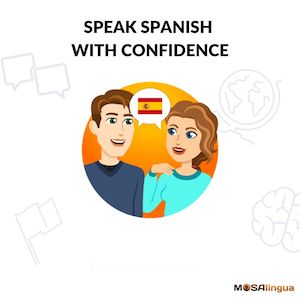
Good news: we have a course for that! The Speak Spanish with Confidence MasterClass.
It’s a comprehensive 8-module course designed to help you improve every aspect of your spoken Spanish – fluency, confidence, pronunciation, and more – step by step, and enjoy doing it.
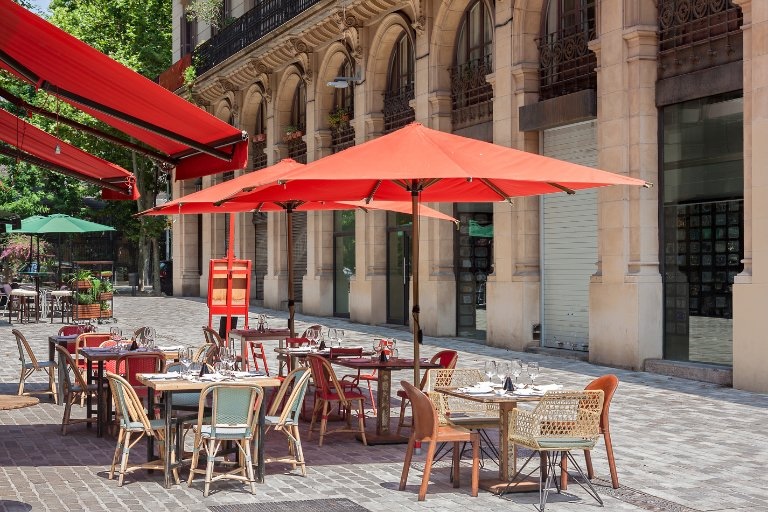
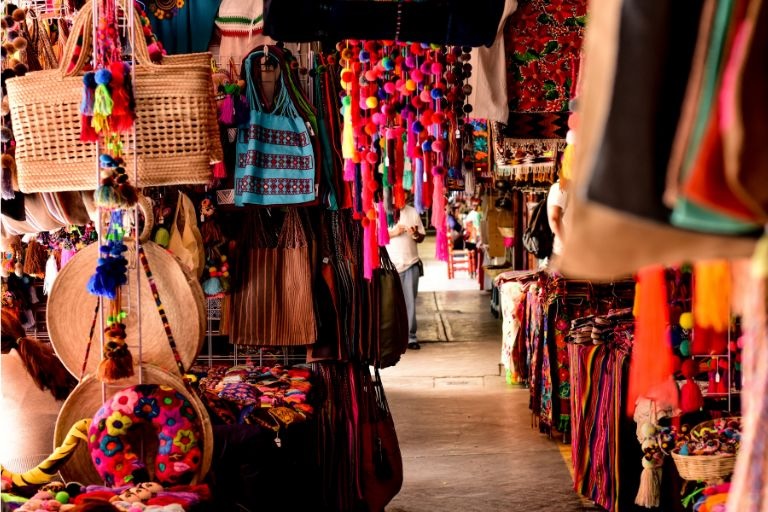
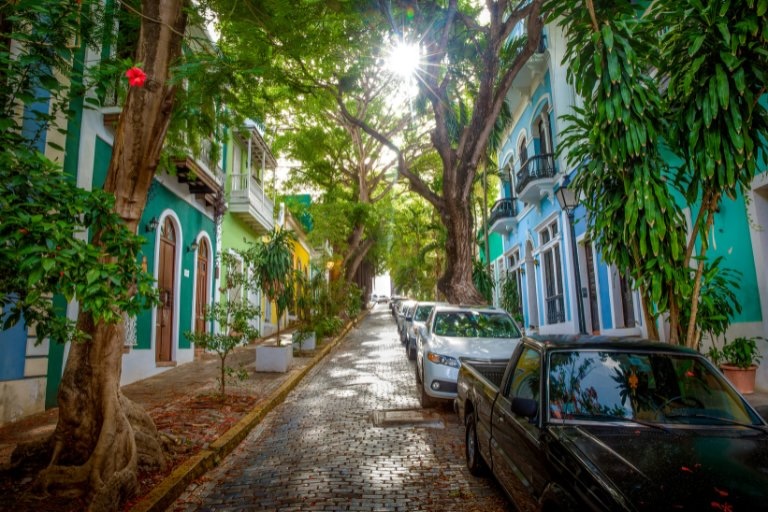




Hi,
This post is very nice and helpful post. One of the best parts of travel in a foreign country is that you can meet new people in all areas of life. Most of them will be happy to talk to you. Here the language has given importance because here the language of the Spanish is spoken. So, it is said that the importance of language has been given importance here.Thanks for sharing your post…